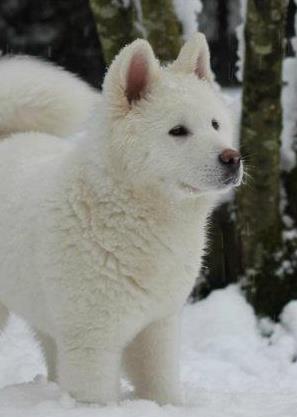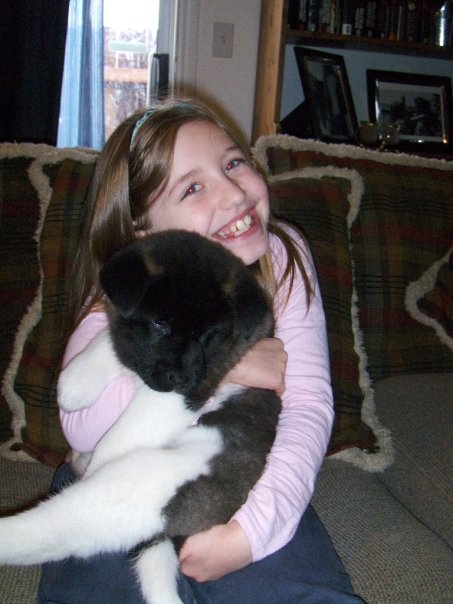Copyrighted article republished with permission To subscribe to Akita Planet, please email akitaplanetpublishing@gmail.com or visit http://www.akitaplanet.org
The Akita isn’t part of the Working group for nothing; these strong, intelligent canines excel at a multitude of tasks to help their human partners in everyday life. Whether guarding the home, hunting, pulling sleds or carts, or even tracking, the Akita is well-suited for the job. Over the years I have been blessed to have produced a number of pups that went on to become Service dogs, assisting their owners with the challenges of various disabilities.
It’s important to take the time to evaluate a litter for the traits that indicate what job each pup may be best at later in life. This is an exercise in patience, as you try to focus on a group of bouncing, bumbling fur balls! How exactly do you separate the pups with potential for occupational services?
I begin the process when the litter is about three weeks of age. By this time the pups are well on their feet and starting to explore the edges of their little world. Curiosity tempered with reserve is one characteristic to watch for. I’m looking for the puppy that boldly strikes out to explore – but then pauses to size things up from a short distance before going any further. This is a pup that is thinking the situation through, rather than rushing headlong into what could turn out to be a mistake. Does the puppy use all five senses to investigate people and objects? The pup that leaps into your arms is endearing and fun, but for service aptitude I want the puppy that looks at an object from all angles. I like to see her cock her head from side to side in order to hear better, reach out a paw to touch before pouncing, get a good, long nose full of scent, and maybe even take a tentative taste. You should be able to “see the wheels turning” as the puppy assimilates information. A good service dog is always assessing their surroundings – a natural multitasker who seems perfectly at ease while doing so.
I also evaluate how the dog reacts when I try to attract its attention. I’m looking for the pup that has eyes on me even when interrupted by others at play. When startled or distracted, how quickly does the puppy recover and refocus on the handler?
Any puppy for service jobs must have a high desire to please, so that is another important quality to screen for. Will the pup bring objects to you and retrieve on the toss? Can you direct the puppy to an object you prefer and make that preference clear to him? Once the pup understands your desire for a specific action, does he lose interest or does he seem to be waiting for the next directive? I want the puppy that wants to do the job, and I like to see initiative.
Play should be encouraged; a puppy needs to exercise body and mind and learn appropriate social cues from their dam and littermates. Observe the pup during playtime to assess how it reacts when play gets too rough. Look for pups that are able to accept correction from their dam and move on to the next adventure with little delay. The puppy should not be devastated at being corrected; no excessive whining, crying or hauling itself off to sulk. Neither should the pup refuse the correction and act out in an oppositional manner.
As the litter matures, begin teaching simple things such as paper or litterbox training. Is the puppy you’ve been giving high marks to so far picking up training quickly? How often must you demonstrate how to respond to a command before the pup performs properly? Does he respond best to voice or hand signals? Can he follow either without distraction? Expect natural puppy inquisitiveness and short attention spans to come into play, and you may not get the desired response every time – after all, they are still just babies. That’s OK; it’s a pattern of behavior over time that matters. Keep notes as you go.
A vital consideration during the evaluation period is prey drive –we are talking about the Akita, after all. Pups that perform the fastest, most efficient “squeaker-ectomies” on stuffed toys are not what I’m looking for. Although they should still show some interest in things around them, they need to be able to refocus on whatever they are currently doing. Pick a toy the puppy seems to prefer and engage in play, praising the puppy for working with you on this task. Then introduce a different interesting toy, tossing it around the area perimeter while simultaneously working on the interactive task you first introduced. It may take several tries, but give high marks to the puppy that continues to choose the interaction with you rather than the new distraction.
By this time your puppies are nearing placement age. Ideally you’ve been working on general socialization skills, such as walking on at least five different kinds of surfaces and socializing outside of the family unit. Can the puppy continue to remain on task despite alternative distractions? For these tests I put the puppy on a leash, allowing it to drag the length a bit to feel some resistance without a jarring impact. I keep a small bin of scrunchies (soft, fabric-covered elastic) with bits of ribbon, small bells and other lightweight items sewn on. I have these in several sizes, some to fit around the leg and others large enough to go over the neck or chest. The puppy needs to be able to regain and maintain concentration on you and the current task, rather than constantly stopping to look at, play with or remove the distractions she is wearing. This is building a handler/puppy relationship, teaching them to trust in the process and ignore certain harmless things around them. Eventually add immobile and then moving toys to the ground work around the puppy as you walk her, in order to acclimate her to environmental distractions. Gauge her response. Being initially startled is acceptable if the puppy can recover with confidence. Start small, and praise often for correct responses.
I keep puppies with the highest marks in these areas for up to 16 weeks, further evaluating which types of service work they are best suited for. For instance, a puppy that responded best to hand signals went on to learn hearing-assistance work. Other pups that excelled at voice commands and had the physical structure to support a human with gait and movement disabilities went on to become mobility service dogs.
Paying close attention to the strengths and abilities of each pup can help make the strongest placement in an environment that not only helps owners in need, but is rewarding to the dog as well.







You must be logged in to post a comment.